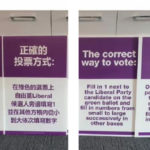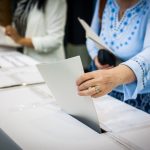Over 200,000 Australians Could Be Prohibited from Voting in Federal Election

Understandably, there’s public outrage over a recent decision by the Australian Electoral Commission which could – unless quickly reversed or rectified – prevent more than 200,000 people from voting in this weekend’s federal election.
The ruling essentially means that anyone who has tested positive to Covid-19 in the past several days will be unable to physically attend voting booths.
Anomaly in the rules
Voting is available for people who confirmed their infection after Tuesday (earlier this week), but those who have confirmed a positive Covid-19 result earlier than that and who had not already registered for a postal vote currently have no way of voting.
It may sound like a small anomaly, but is one that has the potential to significantly impact the democratic process.
Undermining democracy
Voting is a basic democratic right in Australia. It’s eerily similar to many of the draconian laws and regulations introduced during 2020 and 2021 under the guise of ‘protecting public health’ which infringed on our basic rights, were discriminating and resulted in further marginalising Australians.
The rule will also put people at risk of being fined for not voting.
The offence of failing to vote
Enrolling to vote in an Australian federal election was made compulsory for all Australian citizens in 1912.
Due to a large number of people enrolling but not actually voting, the law was changed in 1924 and it became compulsory to register a vote.
Under the Electoral Act 1918 (Cth), voting is compulsory for Australian citizens who are at least 18 years of age.
Those who are 16 or 17 years old can apply for eligibility to vote.
Australians who are currently ineligible to vote include:
- Those of unsound mind and incapable of understanding the nature and significance of enrolment and voting,
- Those convicted of treason or treachery, and
- Those serving a prison sentence of 5 years or more.
Eligible Australian citizens who who fail to vote are subject to a fine – which under section 245 of the Electoral Act is $20 but could blow out to over $200 if left unpaid.
Voting is not compulsory for eligible citizens residing in Antarctica, or are considered ‘eligible overseas electors’ or ‘itinerant electors’.
Telephone voting
While the AEC has confirmed that telephone voting is an emergency option, it has at the same time conceded that an ‘overload to the system could result in it breaking down.’
And if history is anything to go by, the Australian Government’s track record with large-scale technology-based projects is not exactly exemplary.
Many initiatives including the 2016 census, My Health Record, and the original CovidSafe tracking App developed by the Federal Government have been very expensive failures, fraught with a litany of errors and failures.
Legal challenge
Victorian Independent candidate Dr Monique Ryan, who is running in the same electorate as Josh Frydenberg, is launching a legal challenge against Special Minister of State Ben Morton who has oversight of the relevant legislation.
Her legal team is expected to submit an application in the Federal Court today to challenge the legality of the rule.
Ms Ryan says that the disenfranchisement of voters “is the result of a decision by the Morrison government” and said the legal action would be brought against government MP Ben Morton, who is responsible for electoral oversight in his capacity as special minister of state.
PM ‘passes the buck’
The Prime Minister himself, who appeared on national television to discuss the issue, passed the buck as usual, saying that ‘election rules are the responsibility of the independent Australian Electoral Commission.’
While the AEC says it is working to find a solution it has also defended the rule saying that “by point of comparison, voters in Canada didn’t have a service if they tested positive” which could be considered a bit of a “cop out” by those Australians affected – after all, Australia is not Canada, and continually justifying locally implemented Covid-19 rules based around what’s being administered in other countries is beginning to wear a bit thin.
There have been state and local elections across Australia during the pandemic, which managed to run relatively smoothly. It seems implausible and somewhat irresponsible that in all of the disruption across all areas of the way we work, live and socialise over the past two years, the government hasn’t considered options for voting against a pandemic backdrop.
The problem now of course, is that the election is less than 24 hours away – an equitable, workable solution needs to be found quickly.







